When a plumbing emergency occurs, it’s important to remain calm and call for help right away. A professional plumber will be able to assess the situation and provide quick solutions to prevent further damage. Get in touch with Emergency Plumber Aurora CO for professional support.

Not all plumbing problems are emergencies, though. For example, you might not need a 24-hour plumber for a clogged drain.
A plumbing emergency can happen anytime, often when you least expect it. This is why it is essential to have a professional plumber available for emergencies like water leaks, burst pipes, flooding and more. These professionals are specially trained to handle these issues and come equipped with the right tools and skills to do so quickly. This way, you can minimize damage to your home and save on expensive repair costs in the long run.
An emergency plumber will arrive at your location as soon as you call them, ensuring that they are always available to address your plumbing issues no matter when they occur. They will also be able to provide you with valuable advice and tips for maintaining your plumbing systems, helping you avoid costly emergency situations in the future.
One of the most common reasons to call an emergency plumber is to deal with a sewage backup. This is a huge health hazard that needs to be dealt with immediately before it causes even more damage. A professional plumber will be able to locate the source of the problem and help you clear it in no time.
Other common emergencies include a burst pipe, which can cause extensive flooding and leave your property completely unusable. A clogged drain or toilet can also lead to overflow and water damage, and this requires immediate attention. Emergency plumbers are available around the clock and will be able to fix your problem promptly, preventing further damage to your property and belongings.
While a small leak or clog might seem harmless, it can quickly turn into a catastrophe. Delays in addressing these problems can lead to extensive water damage and mold growth, which can be harmful to the health of your family and pets. Emergency plumbers are able to respond quickly and will be able to spot other potential problems that might be in the pipeline, preventing them from becoming serious.
Once an emergency plumber has arrived at your location, they will assess the situation and carry out a thorough inspection of your plumbing system to identify the root cause of the issue. They will then recommend appropriate solutions and repair work. They will also discuss the estimated cost of the repairs and provide you with a timeline for when they will be completed. In addition, they can implement temporary fixes to limit any further damage and flooding.
Preventive Measures
The longer plumbing emergencies are left unattended, the more damage they can cause to your home and belongings. The best way to reduce the risk of these emergencies is to have a preventive maintenance routine in place that includes regular inspections and servicing. A reputable emergency plumber will be able to spot any potential problems and address them before they escalate into costly emergencies.
Some of the key steps that you can take during a plumbing emergency include shutting off the water supply, assessing the extent of the problem, and using buckets or towels to contain any excess water. It’s also important to keep valuables away from affected areas and to document any damage for insurance purposes. Once the crisis has been resolved, an emergency plumber can provide a long-term solution to prevent future problems.
When choosing an emergency plumber, make sure to select one with a valid license and extensive experience in handling all types of plumbing issues. Additionally, look for a service that prioritizes clear and effective communication, which can help to alleviate stress during a crisis.
Common emergency plumbing situations include burst pipes, sewer backups or clogs, and overflowing toilets. These problems can cause significant water damage, property loss, and health hazards, so it’s essential to respond quickly and call a professional as soon as possible.
There are several steps that you can take to reduce the risk of plumbing emergencies, including completing regular maintenance, monitoring water pressure levels, and installing a water heater pressure relief valve. In addition, it’s important to know the location of your home’s main water valve and how to turn it off in an emergency. You should also keep trees and shrubs away from your drain lines to avoid root intrusion and blockages. Taking these precautions can help you minimize the risk of an emergency plumbing situation and keep your family and pets safe.
Expert Advice
In the case of a major plumbing issue, emergency plumbers are often called in to assess and repair the damage. These professionals will have the experience and knowledge to handle any type of plumbing problem, no matter how severe. They can also provide valuable advice and tips to help avoid future problems, which may save you time and money in the long run.
A good way to identify a reliable emergency plumber is to check reviews and testimonials online. This will give you a clear picture of their professionalism and quality of work. Additionally, you can ask for recommendations from friends and family who have used their services in the past.
Once you have found a trustworthy plumber near you, it is important to communicate clearly about the issue at hand. Ensure the plumber understands exactly what is happening, and any symptoms you have noticed. This will help them arrive at your home prepared to tackle the job and prevent any unnecessary delays or complications.
Another thing to keep in mind is that not all plumbing issues are considered emergencies. For instance, a burst pipe will cost less to repair than a flood. Similarly, a clogged drain will not be as costly as a sewer backup. However, if the clogged drain is causing sewage to back up into your property, it is a serious health and safety hazard that needs to be addressed immediately.
When choosing an emergency plumber, make sure they offer a guarantee on their services. This will give you peace of mind that the work will be completed to a high standard and any problems will be fixed. It is also a great way to see how committed the plumber is to providing excellent customer service. If they are not willing to offer a guarantee, it may be best to look for another plumber.
Peace of Mind
A good emergency plumber can take some of the stress out of dealing with a plumbing disaster. They will help you to understand the problems and find solutions that will minimize damage, saving you money in the long run. They will also do some investigative work to make sure they find the root of the problem so you can avoid band-aid repairs that could cost you even more money in the future.
Homeowners spend billions yearly to fix water damage that happens due to malfunctioning plumbing systems. These issues can also be safety hazards for your family, as they can result in structural damage and electrical problems. A professional emergency plumber can handle these hazards quickly, ensuring your home is safe and secure.
Many people try to save money by using DIY plumbing repair methods, but this can lead to worse problems. An expert emergency plumber can fix the problem more efficiently and ensure it won’t happen again. They will use advanced tools and technology that can find the cause of the issue, so you won’t have to keep spending money on band-aid fixes.
Peace of mind is a feeling of tranquility and contentment, free from worry or anxiety. You can achieve peace of mind by spending time with loved ones, exercising, or meditating. It’s also important to stay away from people and situations that threaten your self-respect, values, or morals.
A reputable emergency plumbing service will have 24/7 availability, quick response times, and in-depth industry knowledge. They will also provide peace of mind by being licensed, insured, and bonded. They will also perform background checks on their plumbers, so you can rest assured that your home and family are in good hands. It’s best to contact an emergency plumbing service near you, as this will minimize travel costs and time spent on the job.
